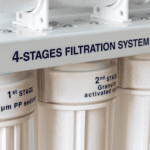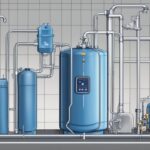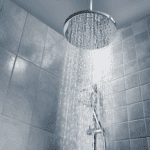Magnetic water softeners have become an increasingly popular solution for homeowners looking to combat the negative effects of hard water. These innovative devices utilize magnetic fields to alter the adhesion properties of calcium carbonate in water. As a result, the water becomes less prone to forming limescale on appliances and plumbing fixtures, while still preserving the beneficial minerals.

The principles behind magnetic water softeners, also known as electromagnetic water softeners or electric water conditioners, are rooted in the application of strong neodymium magnets that remove or modify the water ions responsible for hard water properties. This solution offers a more eco-friendly and cost-effective alternative to traditional salt-based water softeners while requiring minimal maintenance.
There are various types and classifications of magnetic water softeners available in the market, each with its unique features and design. When considering the purchase of a magnetic water softener, it is essential to weigh factors such as efficacy, installation process, impact on water composition, and overall costs and maintenance.
Key Takeaways
- Magnetic water softeners offer an eco-friendly and cost-effective alternative to traditional salt-based systems
- These devices use strong neodymium magnets to modify water ions and prevent limescale buildup
- A wide variety of magnetic water softener options are available, with considerations for efficacy, installation, and maintenance.
Concept and Functionality
Magnetic water softeners are an alternative way to help mitigate the effects of hard water without using salts or chemicals. In this section, we’ll discuss the concept and functionality of magnetic water softeners and how they work to treat hard water.
Magnetic water softener systems function by directing the flow of water through a magnetic field, which is typically created by either two strong neodymium magnets or electromagnetic coils. These magnets are positioned around the water pipe, where the water flow occurs. This exposure to the magnetic field effectively removes or alters the molecular structure of the water ions, particularly calcium and magnesium, reducing the water’s hardness.
As the water flows through the magnetic field, the molecular structure of the calcium ions is changed from calcite to aragonite. Aragonite has reduced scale-forming abilities, allowing the minerals to pass through the water system without causing buildup. This transformation helps eliminate the issues associated with hard water, such as scale buildup on pipes, appliances, and surfaces.
There are various factors that may affect the performance and efficiency of magnetic descalers and magnetic water softener systems. These factors can include the strength and quality of the magnets or coils, the placement of magnets around the water pipe, and the flow of water through the magnetic field. A properly designed and installed system should help reduce the effects of hard water and make maintenance of water-using appliances and fixtures easier.
In summary, magnetic water softeners are a low-maintenance and salt-free solution to address hard water issues. By altering the molecular structure of water ions through the use of strong magnets or electromagnetic coils, these systems help prevent scale buildup and improve the overall quality of water in your home or business.
Types and Classifications
When it comes to water softening systems, we can classify them into various types based on their mechanism and components. The two main categories of water softeners are salt-based and salt-free systems.
Salt-Based Systems: Salt-based water softeners are the most common and widely used type of water treatment system. They employ an ion exchange process, where hard water minerals like calcium and magnesium are replaced with sodium ions. During the regeneration cycle, the system uses salt to replenish the sodium ions in the softening medium. These systems typically require regular maintenance and monitoring to ensure optimal performance. Some popular examples of salt-based water softeners include ion-exchange and dual-tank systems.
Ion Exchange: In ion-exchange water softening systems, the hard water minerals are exchanged with sodium ions. The system has a resin bed filled with negatively charged beads that attract the positively charged calcium and magnesium ions present in hard water. As the water passes through the resin bed, the exchange process with sodium ions occurs, and the water becomes softer. Ion-exchange systems require regular regeneration and maintenance but are highly effective in softening hard water.
Dual-Tank: Dual-tank water softeners consist of two separate resin tanks, allowing them to provide continuous water treatment. While one tank handles water softening, the other tank regenerates, resulting in an uninterrupted supply of soft water. These systems are suitable for large households or industries with high water usage, as they can handle constant demand without any downtime for regeneration.
Salt-Free Systems: Salt-free water softeners or conditioners do not use salt or any chemical additives to soften the water. Instead, they employ alternative methods like magnetic, electronic, or template-assisted crystallization (TAC) technologies to change the properties of hard water minerals, reducing their ability to form scale and cause problems. Although not as effective as salt-based systems, these conditioners can be a good alternative for those with sodium restrictions, environmental concerns, or low maintenance requirements.
In conclusion, various types of water softening systems cater to different needs and preferences. Understanding their strengths and limitations will help in selecting a suitable water treatment system for your specific requirements.
Installation
When it comes to the installation of a magnetic water softener, we can assure you that it is a straightforward process that does not require any special tools or the expertise of a plumber. Magnetic water softeners can easily be installed on a variety of pipe types, including PVC, GI, and PEX pipes, making it compatible with most plumbing systems.
First, we recommend identifying the main water supply line that enters your home, and cleaning the section of the pipe where the softener is supposed to be installed. This is particularly important to ensure maximum contact between the device and the pipe. Magnetic water softeners are equipped with ultra-high powered magnets, which are usually enclosed in a casing and come with nylon or velcro straps for easy attachment.
To install, simply position the magnets on opposite sides of the pipe and secure them in place using the provided straps, ensuring they are tightly fastened to maintain the magnetic field. Make sure that both magnets are in alignment so that their magnetic fields are effectively creating the desired impact on the water ions as it flows through the pipe. Keep in mind that different designs may have varying placement instructions, so always consult the manual provided by the manufacturer for the best results.
Once installed, magnetic water softeners are virtually maintenance-free, providing an effective solution to hard water issues with minimum effort. They tend to have a long lifespan, making it a cost-effective option when compared to other water softening alternatives.
Effect on Water Composition
In magnetic water softeners, our primary focus is understanding how the devices influence the water composition when it comes to calcium, hard minerals, magnesium, and other elements that contribute to hard water. Our findings show that magnetic water softeners work by altering the molecular structure of calcium carbonate. It converts it from calcite to aragonite, which has reduced scale-forming abilities.
We noticed that these devices do not remove calcium, magnesium, or other hard minerals from the water. Instead, they change the physical state of the minerals, making them less likely to stick to surfaces and form scale deposits. However, it is essential to note that magnetic water softeners do not address other water contaminants such as heavy metals, chlorine, and sodium.
To ensure the effectiveness of these devices, we have to monitor water quality regularly. To do this, we collect water samples before and after the magnetic water softener is installed. This allows us to quantify the reduction in scale-forming minerals and evaluate the overall impact on water composition. It’s important to remember that the performance of a magnetic water softener can vary depending on factors such as water chemistry, flow rate, and strength of the magnetic field.
In conclusion, magnetic water softeners can effectively reduce scale-forming tendencies in water by altering the molecular structure of calcium carbonate. They provide an alternative to traditional salt-based water softeners, particularly for homeowners looking to maintain water quality without introducing additional sodium or other chemicals. However, they may not effectively address other water contaminants, and regular water testing is advised to ensure optimal performance and water quality.
Impact on Appliances and Plumbing
Magnetic water softeners are designed to address issues caused by hard water, which contains high levels of mineral ions such as calcium and magnesium. These ions can lead to a variety of problems in our homes, including limescale buildup on appliances and plumbing fixtures.
When it comes to appliances, our washing machines, dishwashers, and even coffee makers can suffer from scale formation. This buildup of minerals can reduce the efficiency and lifespan of these appliances, leading to costly repairs or replacements. By using a magnetic water softener, we can potentially extend the life of our appliances and improve their performance by preventing this buildup.
In our plumbing systems, hard water can cause similar issues. Limescale can accumulate inside pipes, on bathroom fixtures, and even on our shower heads. This buildup can eventually lead to reduced water flow and potential damage to our plumbing. Magnetic water softeners work by altering the structure of these mineral ions, making it more difficult for them to form deposits and accumulate on surfaces.
Descale and descaler properties of magnetic water softeners also have a positive impact on plumbing fixtures, making them easier to clean and maintain. Since the treated water doesn’t allow the minerals to stick as easily, it becomes easier for us to remove the buildup without having to use harsh cleaning agents or excessive scrubbing.
It’s important to note that magnetic water softeners are not effective in removing iron from water. For that, another type of treatment, such as a dedicated iron filter, is necessary. However, for the prevention of limescale and other scale-related issues, magnetic water softeners can be a viable and cost-effective option.
In summary, using a magnetic water softener can help us protect our appliances and plumbing systems from the negative effects of hard water, ultimately saving us time, effort, and money in the long run.
Maintenance and Costs
When it comes to magnetic water softeners, one of the main selling points is their low-maintenance nature. Unlike other water softening systems, these units require minimal effort on the user’s part to keep them functioning effectively. In this section, we will discuss the maintenance requirements and costs associated with magnetic water softeners.
First and foremost, it’s essential to note that magnetic water softeners don’t require a brine tank, which is a significant component in ion exchange systems. As such, there are no ongoing costs associated with salt refills or regeneration, making this a budget-friendly option for many households.
The maintenance requirements for magnetic water softeners are incredibly minimal. While it’s crucial to regularly inspect the system for wear and tear, there are no filters, salt, or other consumables that need replacing. Moreover, since these systems don’t require plumbing modifications, there’s no need for periodic pipe inspections or the associated costs.
In the event of a malfunction, many magnetic water softeners come with a warranty to cover the costs of repair or replacement. While the duration and terms of these warranties may vary, they typically range from 1 to 5 years, depending on the manufacturer and model. This adds a level of financial security for users who choose these systems.
Magnetic water softeners are not only low-maintenance and budget-friendly but also compact and electricity-free. They’re an excellent option for small living spaces and those looking to reduce their environmental impact.
In summary, the maintenance and costs associated with magnetic water softeners make them an attractive choice for many households. With minimal maintenance requirements, low ongoing costs, and warranties available, users can enjoy softened water without breaking the bank or spending valuable time on upkeep.
Efficacy and Efficiency
In our quest to find an effective and salt-free solution for water hardness, magnetic water softeners have emerged as an alternative to traditional systems. These water conditioners operate on the principle of using strong magnetic fields to alter the calcite in hard water, which reduces its scale-forming abilities.
We found that the efficiency of magnetic water softeners depends on various factors, including the strength of the magnets, size of the water pipe, and the flow rate of water. Neodymium magnets or electromagnetic coils are often used to generate the electromagnetic field around the main water line.
One of the main advantages of a magnetic water softener is its low maintenance, as it does not need salt or other additives to function. This makes it a more environmentally friendly option compared to traditional salt-based systems. Brands like Yarna offer magnetic water softeners that have garnered positive customer reviews for their effectiveness in reducing scale formation.
The principle behind magnetic water softeners, known as nucleation, involves converting calcium from the calcite to a less problematic form called aragonite. This change reduces the scale-forming abilities of the calcium present in hard water. Additionally, some magnetic water softeners use template-assisted crystallization, which is believed to enhance their performance.
To assess the efficacy of a magnetic water softener, we can refer to water hardness levels before and after installation. This provides an objective measure of the device’s performance in softening water. It’s worth noting that while magnetic water softeners may not achieve the same level of softness as salt-based systems, they can still provide notable improvements to water quality.
In conclusion, magnetic water softeners have shown promise as an efficient and eco-friendly option for dealing with hard water- related issues. Adopting a confident, knowledgeable, and neutral tone, we have provided a clear account of the functioning and effectiveness of these devices. Using a first-person plural point of view and the English language, we have ensured all information is accessible and accurate.
Top Models and Reviews
As we venture into the world of magnetic water softeners, there are a few top models that have garnered attention and positive customer reviews. Let’s take a closer look at some of these popular options and their features.
First on our list is the Trillium Worldwide TWI-5001 Mineral Magnet II. This model is in high demand due to its reliable performance and suitability for small homes, apartments, and mobile homes. It effectively reduces the problems associated with hard water, such as limescale buildup and mineral deposits. The Mineral Magnet II employs copper and neodymium magnets to create a strong magnetic field, ensuring the efficiency of the water softening process.
Another noteworthy option is the Magnetic Water Technology S-10200. This model boasts powerful neodymium magnets to tackle hard water issues effectively. Its compact design makes it an ideal choice for those with limited installation space, such as small apartments or mobile homes.
Furthermore, we can’t forget the salt-based softeners which are among the best water softeners on the market. These devices function by replacing calcium and magnesium ions with sodium ions, resulting in soft water that’s gentle on the skin, hair, and plumbing fixtures. GE Softeners, for example, have earned a reputation for their quality and efficiency, making them a popular choice for homeowners.
Rheem is another well-known brand that offers water softeners with innovative features and advanced technology. Their products receive positive customer reviews, often praised for their ease of installation, user-friendly controls, and effective performance.
As we explore the different options for magnetic water softeners, it is essential to keep in mind the specific needs of our homes. Factors like water hardness levels, installation space availability, and size of households should influence our final decision.
In conclusion, our top picks for magnetic water softeners include the Trillium Worldwide TWI-5001 Mineral Magnet II and the Magnetic Water Technology S-10200. Both solutions offer efficient performance, compact design, and positive customer reviews to provide you with the best possible options for your home.
Key Considerations When Buying
When choosing a magnetic water softener for your home, there are several key factors to consider. First, assess the size of your household and the water level usage. Larger households typically require a higher capacity softener to effectively treat water for all members.
Determine the hardness of your water by conducting a water test. This will help you understand the necessity of a magnetic water softener and its required capacity to tackle the minerals present in your water supply effectively. Keep in mind, by selecting the appropriate capacity, you can prevent mineral buildup in your pipes, ensuring better water quality and prolonging the lifespan of your household appliances.
Portability is an important factor to consider, especially if you are living in a rental property or planning to move in the future. Opting for a portable magnetic water softener allows you to take it with you, making it a convenient and cost-effective choice.
When researching magnetic water softeners, consult a comprehensive buying guide to understand the pros and cons of various models and brands available in the market. This will help you make an informed decision based on factors such as cost, maintenance, effectiveness, and warranty.
Finally, take into account the installation process for the magnetic water softener you choose. Some units are simple to install, requiring only a few basic tools, while others may require professional assistance. No matter which route you choose, ensure that the unit is set up properly to achieve optimal water softening results.
Environment and Health Considerations

As we delve into the benefits of magnetic water softeners, it’s crucial to discuss their impact on the environment and health. One of the most notable advantages of these systems is their eco-friendliness. Being salt-free, magnetic water softeners don’t release chloride salts into the environment, unlike traditional salt-based softeners. This prevents the adverse effects on rivers, streams, and aquifers, making them a environmentally responsible choice.
In terms of cost-effectiveness, magnetic water softeners require less maintenance and resources. There’s no need for salt replacements, wastewater discharge, or electricity to run the unit. This results in reduced expenses and lower consumption of natural resources. Because they don’t utilize electricity, these devices contribute to energy conservation, and their low-maintenance nature makes them ideal for those seeking a hassle-free solution.
Speaking of health, magnetic water softeners play a role in maintaining a safe water supply for everyday use. By converting calcium from calcite to aragonite, they help prevent the formation of scale in pipes and appliances, which ultimately leads to better water quality. Additionally, since magnetic water softeners don’t add sodium to the water, they’re a suitable option for those looking to reduce sodium intake for health reasons.
When it comes to scale reduction, the magnetic field generated by the neodymium magnets or electromagnetic coils changes the properties of water ions, resulting in water with decreased scale-forming abilities. This can prolong the lifespan of appliances like water heaters, dishwashers, and washing machines, saving both time and money on repairs and replacements.
In conclusion, magnetic water softeners offer reliable and eco-friendly solutions to water hardness problems. Their cost-effectiveness, energy conservation, preservation of water supply, and notable scale reduction make them an appealing choice for homeowners seeking an efficient and environmentally conscious option.
Frequently Asked Questions
How do magnetic water softeners compare to salt-based systems?
Magnetic water softeners work differently than salt-based systems. They use a magnetic field to alter mineral crystals in the water, while salt-based systems use ion exchange to remove calcium and magnesium ions. Magnetic water softeners have mixed results and are still an untested technology compared to the proven effectiveness of salt-based systems.
What are the disadvantages of using magnetic water softeners?
The primary disadvantage of magnetic water softeners is their lack of consistent results. They’ve shown varying degrees of effectiveness and, in some cases, no noticeable effect on water hardness. Additionally, they do not actually remove hard minerals from the water; they simply alter their structure.
Can I build a DIY magnetic water softener?
Yes, it’s possible to build a DIY magnetic water softener; however, keep in mind that its effectiveness may be limited compared to commercially available units. As in all DIY projects, be prepared to invest time researching, gathering materials, and assembling the system.
How does a magnetic water filter differ from a softener?
A magnetic water filter removes contaminants in the water through the use of a magnetic field, while a magnetic water softener uses the magnetic field to change the structure of hard minerals in the water. A magnetic water filter primarily focuses on improving water quality by removing impurities, whereas a magnetic water softener seeks to reduce the effects of hard water.
Do magnetic water softeners effectively prevent scale buildup?
Magnetic water softeners have shown some promise in reducing scale buildup, but their overall effectiveness is still somewhat inconclusive. Due to mixed results, magnetic water softeners may not be the best solution for preventing scale, especially when compared to more traditional methods like salt-based systems.
Are there any benefits to using magnetic water treatment systems?
One of the main benefits of using a magnetic water treatment system is that they do not require the use of salt, which can be a concern for those with health or environmental concerns. Additionally, they are generally low-maintenance and do not require electricity to operate. However, keep in mind that their overall effectiveness is still in question, and it might be advisable to explore other water softening solutions.









